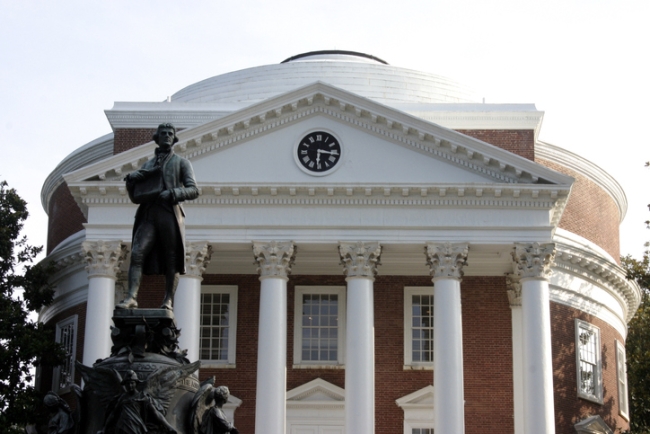You have /5 articles left.
Sign up for a free account or log in.

In the next few weeks, Florida legislators will consider a bill that, among other things, eradicates academic freedom and tenure for professors, bans gender studies and critical race theory, and—in their place—promotes the study of the U.S. Constitution, the Bill of Rights and The Federalist Papers.
Passing this bill would be a bad idea—but not for the reason you might think.
Let’s begin with tenure. No one likes the image of rewarding lazy elitists who are unaccountable to the public. But that’s just a caricature. And, like all caricatures, it dodges the really hard question: What’s the point of professorial tenure in the first place?
For an answer to this question, don’t rely on cherry-picked anecdotes about tenured radicals. Look instead to America’s classical statement on tenure, which was issued in 1915 by the American Association of University Professors. There you’ll see that the main justification of lifetime professorial tenure is the same as the justification for lifetime tenure for members of the federal judiciary.
The framers of the Constitution viewed lifetime tenure as the foundation of America’s independent judiciary. It gives federal judges the freedom to pursue enduring principles of justice without being influenced either by the president who appoints them, or by the changing trends of public opinion. It’s crucial to the classic American theory of counter-majoritarianism, which holds that democratic majorities are likely to persecute unpopular minorities unless checked and balanced by institutions like the judiciary.
Lifetime judicial tenure isn’t then the perk of an elite few. It’s a principled way to achieve the goal of good government in a democratic republic.
The same goes for academic tenure. Its goal is to give professors the freedom to pursue lasting truths without being cowed either by the trustees and presidents who appoint them, or by powerful majorities who might be offended by their teachings or findings. In the same way that tenure allows the judiciary to be an independent voice for justice, it allows the university to be an independent voice for truth.
The protections of academic tenure aren’t then merely academic. Nor are they merely procedural. They’re substantive and political: they have an essential place and function in the American conception of good government.
Do some professors abuse the protections of tenure? Without doubt. So, undeniably, do some federal judges. But tenure’s abuse by a few hardly invalidates the possibility of its proper use by many others. Nor does it contradict the most important reason why academic freedom and tenure remain essential for American democracy.
“All governments,” James Madison wrote, “rest on opinion.” The novelty of American government in particular is its attempt to institutionalize opinion. It’s designed to integrate shifting and conflicting public opinions into a range of governmental forms that then all serve to mitigate factional conflict, craft relatively lasting forms of agreement (however suboptimal, incomplete or partial) and, in so doing, achieve stability and continuity over time.
This, at least in principle, is its great strength relative to monarchies, aristocracies, and autocracies, which try to accomplish stability and permanence by ignoring, suppressing, manipulating or dictating opinion.
That strength, however, doubles as a weakness. What happens, after all, if public opinion itself becomes delusional, unstable, self-destructive, intolerant or conflictual? This question worried the framers. “In proportion as the structure of a government gives force to public opinion,” George Washington argued in his 1796 Farewell Address, “it is essential that public opinion should be enlightened.” Madison agreed. “A popular Government, without popular information, or the means of acquiring it,” he wrote in 1822, “is but a Prologue to a Farce or a Tragedy; or, perhaps both.”
In part because of these concerns, Washington and Madison were both firmly convinced of the need to found a nonsectarian National University in Washington, D.C. They failed, as we know. But their reasoning nevertheless remains instructive today.
Washington and Madison imagined a university where the ongoing, nondogmatic pursuit of knowledge would serve as a check and balance against the possibility that the public might form opinions that disregard important facts, deny inconvenient truths or inspire intolerance and factional conflict. In this vision, the university’s epistemic obligations were manifestly political and indeed constitutional in character.
No one saw this more clearly than Thomas Jefferson, who in 1819 founded the University of Virginia. Many readers will be familiar with Jefferson’s famous words about academic freedom. His new university, he claimed, would be based on “the illimitable freedom of the human mind. For here,” he continued, “we are not afraid to follow truth wherever it may lead, nor to tolerate any error, so long as reason is left free to combat it.”
Fewer readers may know that when Jefferson corresponded with professors to coax them to teach and research in Charlottesville, he also offered them lifetime tenure.
In 1818, for example, he wrote to one scholar to say that professors at UVA constituted a “scientific society” of their own and could only be removed by a two-thirds vote of the visitors (who, at the time, included himself and Madison). This meant, as Jefferson put it, that “tenure is in fact for life.”
One year earlier, Jefferson promised another scholar that, at UVA, professorships would be “permanent.” To underline his point, he used a telling Latin phrase: those same professorships, he said, “may be considered as quamdiu se bene gesserint.” This meant that professors couldn’t be suddenly or arbitrarily dismissed by the authority who appointed them. Instead they would continue to hold office as long as they “behaved themselves well” (or “during good behavior”). Not coincidentally, as Jefferson no doubt knew, this same Latin phrase appeared in England’s 1701 Act of Settlement—the law that established judicial independence in England.
It’s certainly true that the formal definitions of academic freedom and tenure didn’t crystallize until 1915, when the AAUP issued its famous Declaration. But their basic norms were anticipated almost a century earlier—by no less than the framer responsible for the Declaration of Independence itself.
Attacking higher education may lead to short-term electoral gains for Governor Ron DeSantis and some Floridian lawmakers. But because the justifications for academic tenure are analogous to the justifications for judicial tenure—and because both derive, in turn, from long-standing American constitutional norms—Florida’s majoritarian attack on academic freedom and tenure, critical race theory, and gender studies is ultimately much more than an attack on so-called wokeism alone.
It’s an attack on one of the checks and balances—the university—our democracy can’t live without. It’s an attack on an ordered liberty—academic freedom—that’s deeply rooted in our country’s history and traditions. And it’s an attack on one of the most basic principles—lifetime tenure in the service of counter-majoritarianism—of the constitutional tradition that DeSantis et al. purport to hold sacred.
Despite what Florida’s proposed legislation may claim, it hardly then represents “education for citizenship of the constitutional republic.” It isn’t even conservative. It’s the legislative equivalent of cutting off your nose to spite your face.
Some legislators may be tempted to vote for it simply because it seems to give a W to the red team. But consistent originalists will vote against it for a much more substantial reason: it’s a prologue to a farce, a tragedy or perhaps both.








